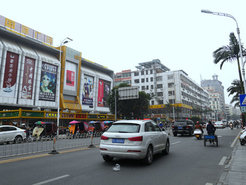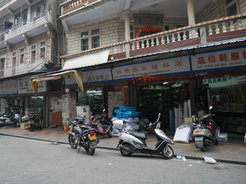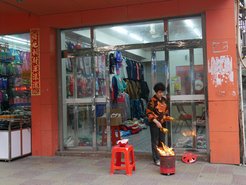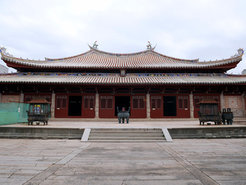Unexpected Economy and Diverse Beliefs in Shishi (China)
Author: Lizhou Hao
April 19, 2016
Shishi (translated as 'stone lion'), a fourth-tier city in southeast China, has an area of 165,000 square kilometres with a population of around 636,700. It is 100 times smaller than the first-tier city Beijing. Unlike northern cities in China, there is not a very clear division between the central city and the surrounding counties and villages. At the same time, the big gap between rich and poor in the city reflects some of the differences typical for other parts of the country. One morning in November, I was sitting in a luxury office and listened to a successor of a small family firm. He was talking passionately about how he developed new high-quality materials in his factory and sold them to Italy not long ago. On the same day in the afternoon, I was standing in a narrow household workshop with rats running by my side. I asked a middle-aged man why his business was suffering a harsh winter. Facing such diverse economic activities in Shishi is a promising start of my fieldwork. Besides others, it raises the question whether and which specific religious practices and moral values are attached to different kinds of economic activities.

Shishi is now the most renowned producing and distributing centre for the textile and clothing industry in Southeast China. Private economy has flourished; the non-public sector makes 90 percent of the city's GDP of 10.3 billion U.S Dollars. Many of the private firms are family businesses of different sizes. For instance, garment accessories production usually takes place in households with three-in-one function: production, storage and living. This makes the city an awesome place for me and it allows for an interesting research sample covering businesses of various types and structures. The textile and clothing industry has become a pillar as well as a barometer of the city's economy. Growing up during 30 years of reform and the opening of China, Shishi was once called 'little Hong Kong' by the locals and was seen as an economic model city in the province around the year of 2000. Although 'little Hong Kong' is out of date nowadays, at least it proves that the city has experienced a boom in the more recent past and has become very international. Before flying back to China, I was optimistic about some economic reports of the first two quarters in 2015. I thought I was going to find a relatively strong local economy in my field site. But things turned out differently.
Last year, world economic growth fell to its lowest rate in six years, growth in international trade slowed down, commodity prices plummeted, and there was growing volatility in the global financial market. All this had a direct impact on China's economy. At the moment, deep-seated domestic problems are becoming prominent and downward pressure on the economy is mounting. In Shishi some businessmen in the textile industry told me that they smelt a first wind of downturn when the orders of their longstanding customers dropped in last autumn. Living in the city centre, I have got used to see the closing of some stores and factories on both sides of the main streets. To revitalize the economy and to make the city a world-class garment centre, the local government has launched a bunch of programs to build a collection of malls for large-scale clothing trade. More to the point, central government, media and businessmen emphasize unanimously that the best way to improve economic performance would be to promote industrial innovation and upgrading. However, a lot of businessmen cannot specify how this should and could be done.

In the past months, I have been striving to assess the role of Confucianism in my field site. Though, not to my surprise, none of my interviewees claimed to regard Confucianism as his or her religious belief. Because a potential relevance of Confucian thoughts can hardly be revealed by a questionnaire, and because I could not find any Confucian Temple in Shishi so far, I always have to mention this issue intentionally while talking with my informants. Luckily, Shishi belongs to a higher-level city called Quanzhou, where there is a Confucian Temple with a history of 1000 years. But I was disappointed to find very few people there even on the anniversary of Confucius’ birth. At least I could observe the local rituals of Confucian worship: offering food and fruits in front of the statue of Confucius just as worshiping ancestors, burning incense and kneeling down (sometimes kowtow) just as worshiping Buddha, burning a stack of 'yellow paper money' (sometimes with good wishes written on them) in an iron bucket just as worshiping Taoist ghosts. This mixture of rituals astonishes me a bit, because according to my knowledge people in North China never or seldom burn yellow paper in a Confucian Temple.
Where has everyday life Confucianism gone? It is unlikely for me to get involved in daily religious practices, because neither do Chinese people practise Confucianism every day nor do we have an official festival of Confucianism in China. Nevertheless, one might still find the remnants of a long-standing Confucian tradition in daily life. For example, local people have very strong clansman concept. They worship ancestors in their own clan ancestral temples on some special days. These temples were built with donations from the members of the big family tree. Not just the whole family tree, but each branch of the tree has its level of temple. The tradition of ancestor worship and the complicated system of ancestral temples is directly related to Confucian culture. The clansman system was based on some theories raised by Zhuxi (1130-1200), a great Confucian in Chinese history. On April 4th, I was allowed by a local family to watch their performance of ancestor worship in a small private temple. Except for the ancestor tablets, I found no difference between the rituals of Confucius and ancestor worship. However, local people do not seem to frame and do not talk about ancestor worship in Confucian terms themselves.


Relevant to business activities, a large number of people in Shishi believe in an Earth God who is in charge of the land where their shops and factories are located. But they do not have a standard icon of their Earth God, because different places should be controlled by different Earth Gods. People believe that the worship of the Earth God would bless them and bring good luck for their businesses. This kind of belief is closely linked to Taoism. The worship is regularly performed in a simple way: offering food in a plate and burning 'yellow paper money' in an iron bucket at the doors of their shops or factories on every 2nd and 16th day of the month. Interestingly, people worship the Taoist Earth God right after they worshiped the Goddess of Mercy, a bodhisattva in Chinese Buddhism. On every 1st and 15th day of the month they offer fruits and burn incense and yellow paper in front of a small statue symbolising the Goddess of Mercy at their homes. Such hybrid practices of Buddhism, Taoism and Confucianism date back to hundreds of years ago and they are still omnipresent in today's China.
The following phenomenon seems to be another good starting point to understand the connections between economic activities, religious ideas and moral values. I was surprised to see an unexpectedly high amount of mutual trust among local people. For example, most of the employees I interviewed do not have proper and signed work contracts with their firms and these same employees say that they do not care about it. Their employers explained this to me by highlighting the difference between small and large enterprises; they say that small family firms do not have to be as formal as large enterprises. I still have to figure out why they think so and how mutual expectations are formed and sanctioned nevertheless. What's more, even activities between business partners of the local society are not always codified by contracts. Although chain debts between many firms are often a result of this practice, trust between these businessmen does not seem to be affected. It is too early for me to understand the underlying mechanisms. But in paying more attention to the moral and potentially religious issues behind such business practices, I shall gain insights into how economic activities are maintained and how they function against the background of a worrying new economic environment.



